什么?安徽省考生2020年ACCA考试不知道看什么书?那么下面的教材宝典你必须收藏
发布时间:2020-01-09
新年伊始,步入2020年,离3月份的ACCA考试越来越近了,相信感兴趣的小伙伴都已经报了名,但51题库考试学习网听说有很多小伙伴们不知道复习应该看什么书,手足无措,不知道该怎么复习。不用担心这个问题,51题库考试学习网会逐一为大家解答困惑:
大家都知道教材是考试复习的基础,跟其他考试一样,考ACCA也是如此,几乎每个ACCA的小伙伴都会买教材,但是并不是每一个小伙伴都会把教材读懂读透。习题固然要练,但是教材才是考试的出题来源,因此小伙伴有必要在练题之前先确保自己已经熟练掌握教材的内容了。希望对大家有所帮助!
在这里51题库考试学习网建议大家可以利用的教材有BPP教材和FTC教材,两者的差别在于BPP教材是全球ACCA使用最多的版本,而FTC版是ACCA官方版本教材,在全球使用也比较多。相对于BPP教材,FTC这套教材的优点是简洁,基本上每门课教材都比BPP版薄,但是FTC对F4阶段的ACCA备考并不是那么适用,其难度较之BPP版有所加大,所用单词也要复杂一些。因此BPP教材的优点也就是相当于FTC来说英语单词较为基础,容易被初学者吸收。同时对于最新FTC版有些地方讲解不是很细致,单凭它参加考试有一定难度
目前这两种都较适合中国ACCA考生,如何选择的关键就在于考生自己,英语基础强一点的,学习效率高的考生就可以选择FTC可能效果好一些;反之,如果是英语相对薄弱一点的,学习能力一般的考生,就可以选择基础的BPP教材。其实,没有万能的学习方法,适合自己的学习方法那才是最好的复习方法,可以借鉴但不提倡照搬。
需要注意的是,每一年ACCA的14门课都会更新他们的TEXT BOOK和练习册。而这两本书,练习册往往被很多小伙伴重视,却偏偏忽视TEXT BOOK。很多的同学复习的时候喜欢记要点,而不愿意花时间读原汁原味的原版书籍。其实这是一个很不好的习惯,既不利于我们准确地把握知识点,也影响了我们专业英语能力的提高。
51题库考试学习网建议各位小伙伴在考试的三个月前,一定要用心看TEXT BOOK。先用一到两个月把书认真地读一遍,再上课、做题直到考前冲刺。考完试后不要着急把书丢在一边拿,大家可以把自己喜欢的章节保留下来,便于以后进一步学习或闲暇时看看读读。当然,千万不要忘记关注ACCA官网的更新,及时下载学习资料。
以上就是报考ACCA的具体规则和流程,想要了解更多2020年ACCA的相关资讯,欢迎加入关注51题库考试学习网,51题库考试学习网将不定时更新你想了解的咨询~
下面小编为大家准备了 ACCA考试 的相关考题,供大家学习参考。
(b) Prepare a consolidated statement of financial position of the Ribby Group at 31 May 2008 in accordance
with International Financial Reporting Standards. (35 marks)

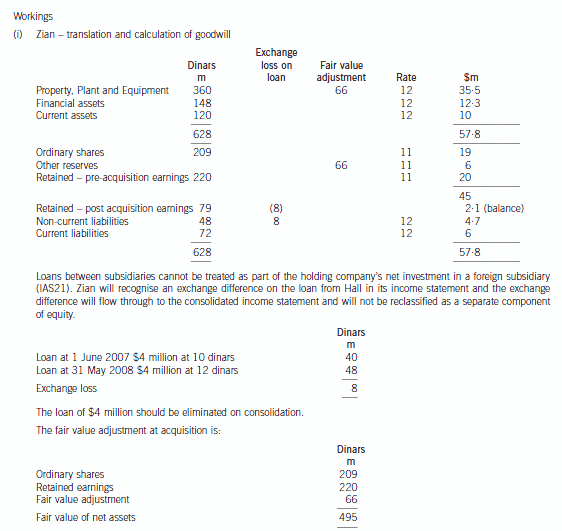


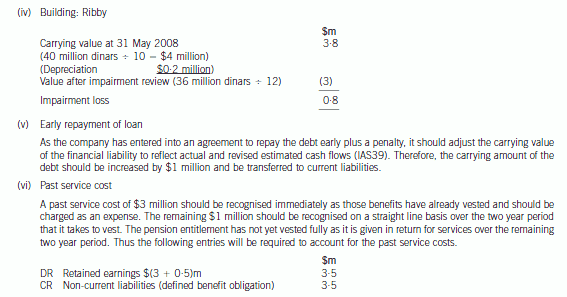
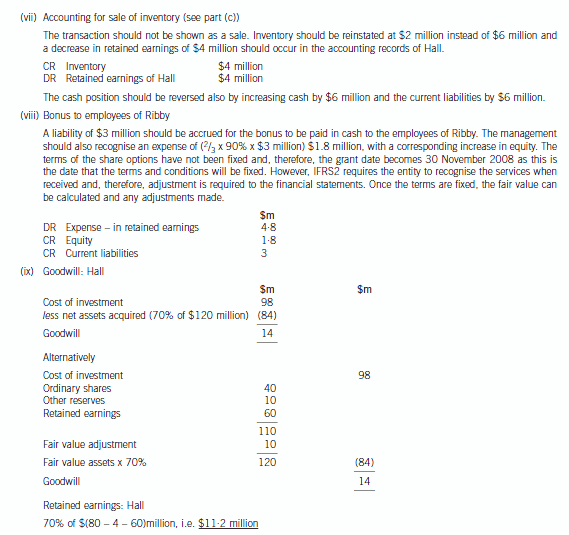
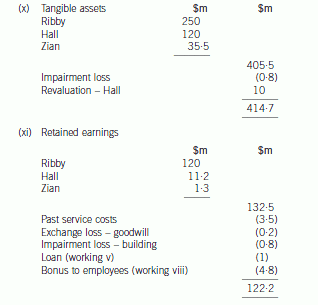
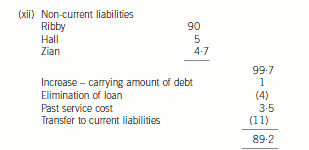
(c) Discuss the difficulties that may be experienced by a small company which is seeking to obtain additional
funding to finance an expansion of business operations. (8 marks)
(c) Small businesses face a number of well-documented problems when seeking to raise additional finance. These problems have
been extensively discussed and governments regularly make initiatives seeking to address these problems.
Risk and security
Investors are less willing to offer finance to small companies as they are seen as inherently more risky than large companies.
Small companies obtaining debt finance usually use overdrafts or loans from banks, which require security to reduce the level
of risk associated with the debt finance. Since small companies are likely to possess little by way of assets to offer as security,
banks usually require a personal guarantee instead, and this limits the amount of finance available.
Marketability of ordinary shares
The equity issued by small companies is difficult to buy and sell, and sales are usually on a matched bargain basis, which
means that a shareholder wishing to sell has to wait until an investor wishes to buy. There is no financial intermediary willing
to buy the shares and hold them until a buyer comes along, so selling shares in a small company can potentially take a long
time. This lack of marketability reduces the price that a buyer is willing to pay for the shares. Investors in small company
shares have traditionally looked to a flotation, for example on the UK Alternative Investment Market, as a way of realising their
investment, but this has become increasingly expensive. Small companies are likely to be very limited in their ability to offer
new equity to anyone other than family and friends.
Tax considerations
Individuals with cash to invest may be encouraged by the tax system to invest in large institutional investors rather than small
companies, for example by tax incentives offered on contributions to pension funds. These institutional investors themselves
usually invest in larger companies, such as stock-exchange listed companies, in order to maintain what they see as an
acceptable risk profile, and in order to ensure a steady stream of income to meet ongoing liabilities. This tax effect reduces
the potential flow of funds to small companies.
Cost
Since small companies are seen as riskier than large companies, the cost of the finance they are offered is proportionately
higher. Overdrafts and bank loans will be offered to them on less favourable terms and at more demanding interest rates than
debt offered to larger companies. Equity investors will expect higher returns, if not in the form. of dividends then in the form
of capital appreciation over the life of their investment.
2 Misson, a public limited company, has carried out transactions denominated in foreign currency during the financial
year ended 31 October 2006 and has conducted foreign operations through a foreign entity. Its functional and
presentation currency is the dollar. A summary of the foreign currency activities is set out below:
(a) Misson has a 100% owned foreign subsidiary, Chong, which was formed on 1 November 2004 with a share
capital of 100 million euros which has been taken as the cost of the investment. The total shareholders’ equity
of the subsidiary as at 31 October 2005 and 31 October 2006 was 140 million euros and 160 million euros
respectively. Chong has not paid any dividends to Misson and has no other reserves than retained earnings in its
financial statements. The subsidiary was sold on 31 October 2006 for 195 million euros.
Misson would like to know how to treat the sale of the subsidiary in the parent and group accounts for the year
ended 31 October 2006. (8 marks)
Required:
Discuss the accounting treatment of the above transactions in accordance with the advice required by the
directors.
(Candidates should show detailed workings as well as a discussion of the accounting treatment used.)
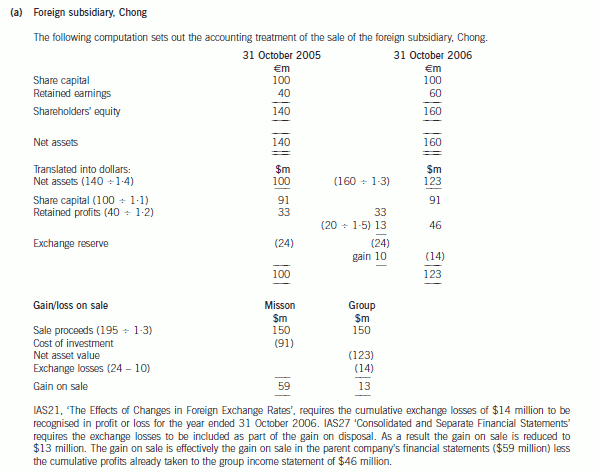
(ii) Explain, with reasons, the relief available in respect of the fall in value of the shares in All Over plc,
identify the years in which it can be claimed and state the time limit for submitting the claim.
(3 marks)

声明:本文内容由互联网用户自发贡献自行上传,本网站不拥有所有权,未作人工编辑处理,也不承担相关法律责任。如果您发现有涉嫌版权的内容,欢迎发送邮件至:contact@51tk.com 进行举报,并提供相关证据,工作人员会在5个工作日内联系你,一经查实,本站将立刻删除涉嫌侵权内容。
- 2020-03-11
- 2020-01-09
- 2019-07-20
- 2020-01-09
- 2019-03-08
- 2019-07-20
- 2020-03-01
- 2019-07-20
- 2020-03-01
- 2019-07-20
- 2020-01-09
- 2020-01-09
- 2020-03-01
- 2020-01-09
- 2019-07-20
- 2020-01-09
- 2019-07-20
- 2020-03-01
- 2020-01-09
- 2020-04-14
- 2020-03-12
- 2021-04-03
- 2020-01-09
- 2020-01-09
- 2019-07-20
- 2020-03-01
- 2021-01-16
- 2020-03-12
- 2019-07-20
- 2019-07-20